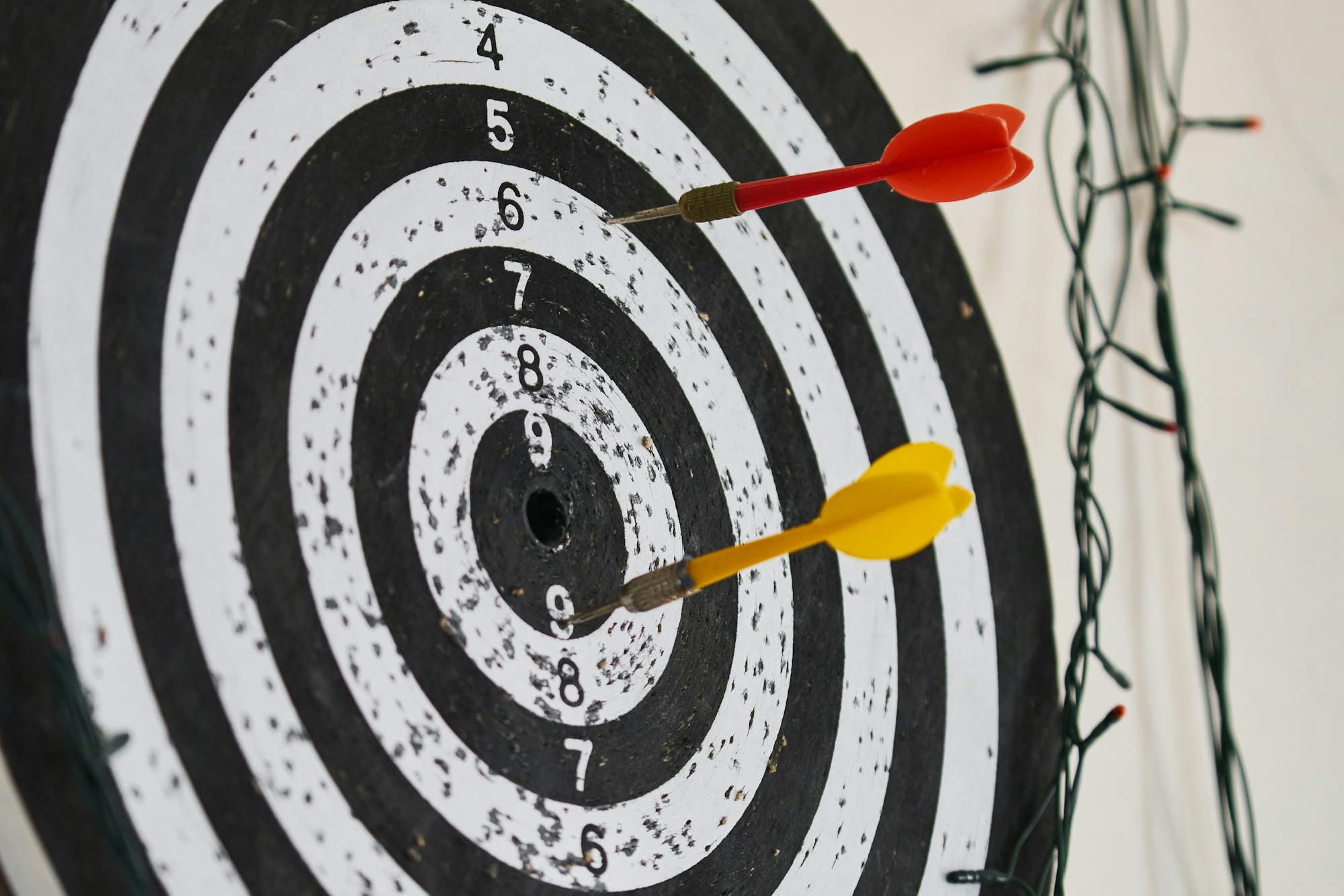Using OKRs for better goal setting

Ever since having open-heart surgery two years ago, I've become a little suspicious of goals and goal-setting. Setting goals isn't a bad thing; we need frameworks for choosing how we invest time and energy, and there's good science that backs up the positive effects of goal setting. But the fact is that you can set goals all you want, but it doesn't prevent life from happening; and when it does happen, being married to your goals can wipe out your framework and all its positive effects.
Even before my surgery, I noticed that I rarely met the 120-day goals I set during my trimesterly reviews. Those goals tended to be like New Years' resolutions: Optimistic, bold, and usually broken not long after they are written. When this would happen (over and over), I'd come away with a real sense of failure. Anything less than 100% completion of a goal, even a realistic one, felt that way. So maybe unconsciously I started doing two things: beating myself up over not meeting goals, and setting trivial goals that I knew I could meet so that I would feel better. Neither course of action is really healthy. Maybe I need a different approach to goal setting.
While I was at Steelcase, I learned about such an approach, in the concept of OKRs. That stands for Objectives and Key Results. OKRs were the standard language of goals at multiple levels of the Steelcase organization. Like a lot of corporate or educational-speak, I didn't take the concept very seriously at first. But after returning from sabbatical and looking at my own goal-setting malaise, I started thinking about how OKRs might be a good alternative to personal and professional goal-setting for people who want to have a framework for long-term growth, but who also feel limited by the usual notion of "goals". That's me, and maybe it's you too.
What is an OKR?
There are two parts to an OKR: the objective, which is a goal you are working toward; and key results, which are 2--5 specific metrics used to track progress toward the objective. In his book Measure What Matters (a standard reference for the OKR concept), John Doerr gives the following simple formula for an OKR:
I will [objective], as measured by [key results].
Unlike other frameworks like "SMART goals", the objective itself doesn't need to be terribly specific. But it does need to be ambitious. The idea is that an objective should describe a state that you eventually want to attain, and it stretches you — it's not 100% certain that the objective can be met in the time frame that is defined. (That time frame can vary; big strategic objectives might frame time in years, while design sprints might be a week or less.)
However, the key results must be specific. And not only must that, they must be observable and ideally measured by a number. The saying is that if it doesn't have a number, it's not a key result. The key results define what "success" looks like relative to the objective and serve as a progress meter as you work toward it. Given an ambitious objective and a handful of metrics for measuring progress toward the objective, you then update your key results regularly and monitor progress and keep an eye out for things that block progress as well as potential updates to the objective itself.
At the end of the time frame, 70% completion is considered a total success. This is what makes OKRs compelling to me. OKRs codify a core truth of life that really gets lost in traditional goal setting: What's important is not merely meeting a goal but setting an ambitious goal and realizing behavioral change as you journey toward it. In fact, meeting 100% of your key results is considered negative — it means that your objective wasn't ambitious enough.
For example, time and again I have set a trimesterly goal of "lose 10 pounds". I have never met this goal in any trimester. I'd exercise and watch what I eat for a week and lose 1-2 pounds; but then I'd slack off and gain it back and then some, get discouraged, and so on, and eventually stop trying. I've realized that the problem here is not the goal — it's totally realistic to lose 10 pounds in 4 months — it's the fact that the goal is all I had. The only thing I was paying attention to was the scale in the morning. Instead, what I needed was a bigger goal and a series of habits to install that point in the direction of that objective, and then focus on building the habits. The objective is just a trailing measure of the habits, a side effect of positive behavioral change, and it's the behavioral change that I really want. So if I set out to lose 15 pounds in 4 months, and "only" lose 8-9 pounds but at the same time build up sustainable habits of diet and exercise, that's not failure — that's a rousing success.
OKRs in GTD
OKRs have become an integral part of my GTD practice, and even without GTD they can still play a powerful role in being in control of your life and work. This is how it works for me:
At the start of every calendar year, I formulate three priorities for the year. (As Jim Collins said, if you have more than three priorities, you don't have any.) For 2021 they are health, writing, and being present with family and friends. Those are pretty general. I sharpen them up a little by turning them into OKRs for each trimester. For example, for the current trimester (January-April 2021), the OKR for writing is the following:
I will write daily and become diversified in my writing practice, as measured by:
Key result #1: Publishing 34 blog posts by May 1.
Key result #2: Engaging in one pomodoro of writing resulting in at least 100 words, each weekday, every week.
Key result #3: Completing a manuscript of the research study I was working on before the pandemic and submitting it to a journal by May 1.
The objective here is also pretty general, but less so; it may not seem like a big stretch to me now, but back in January the concept of writing every day seemed impossible. I was "too busy". Having the objective in front of me disabused me of this notion; I'm not "too busy", I just had higher priorities. If other things really are a higher priority, then that's fine; but as I wrote last time, when you know that writing is a fundamental part of your nature and then don't prioritize it, you have nobody else to blame for the inevitable burnout but yourself.
The key results here are all pretty easily measurable. I have a checklist with 34 boxes on it and check one off each time I post something; I have a similar checklist for daily writing sprints. The research paper has an ad hoc 0-100% progress meter in my notes. Again, getting that paper to 70% completion by May 1 would be considered a significant win.
In GTD language, this OKR would be a formalization of what David Allen calls "Horizon 2" (areas of focus and accountability). The trimesterly OKRs are a buffer zone that sits between, and makes a connection between, specific projects ("Horizon 1") and 1-2 year goals ("Horizon 3"). They take bigger, longer-term vision-related goals and translate them into something more concrete via the key results; and those key results in return often become specific projects. For example "Publish the research study" is an objective here, but it's also a specific project in my Projects list that has an associated list of actions; and the next action (currently, "Write a draft of the Methods section") sits there in my Next Actions list waiting to be done when the time, energy, and context are all right.
I don't typically do this, but a person could construct OKRs for smaller scale items as well. For example, if you (like me) are in academia and are finishing up the semester and thinking about goals for summer, probably one of those goals is plan out my Fall classes. I'm teaching Discrete Structures this fall, so an OKR might be:
I will have the Discrete Structures course completely ready to launch by the end of summer, as measured by:
KR #1: Having all 50 of the instructional videos prepared and uploaded by August 1. (Note: That number 50 is made up. I have no idea how many videos will be needed at this point and I should figure this out before embarking on this OKR.)
KR #2: Having the first six weeks' worth of classroom activities prepared and uploaded to the LMS by August 1.
KR #3: Memorizing the names and faces of all my students by August 15.
Again, 70% completion is a complete success — 35 or so of the videos, the first four weeks of classes, and most of my students names/faces memorized. That sounds like success, and in getting there I would be building strong habits of course prep practice that I can continue after the semester starts. I would accept 50% completion as "pretty good". Along the way this summer, I would update the KR's regularly. If one of them is lagging, I need to ask myself: What's blocking my progress? And importantly, Was this KR a good one, or do I need to change it up? Because another important difference between OKRs and traditional goal setting is that you can adjust the key results or even replace them entirely without changing the goal.
Setting goals is important for staying focused and being in control over what we can exert control over. Not all of us has complete say over our schedule or workload, but there is always something that can be controlled. To that extent, the practice of OKRs is definitely worth consideration to structure the process and ensure that you're measuring the right things — and focusing on the journey and not just the destination.


